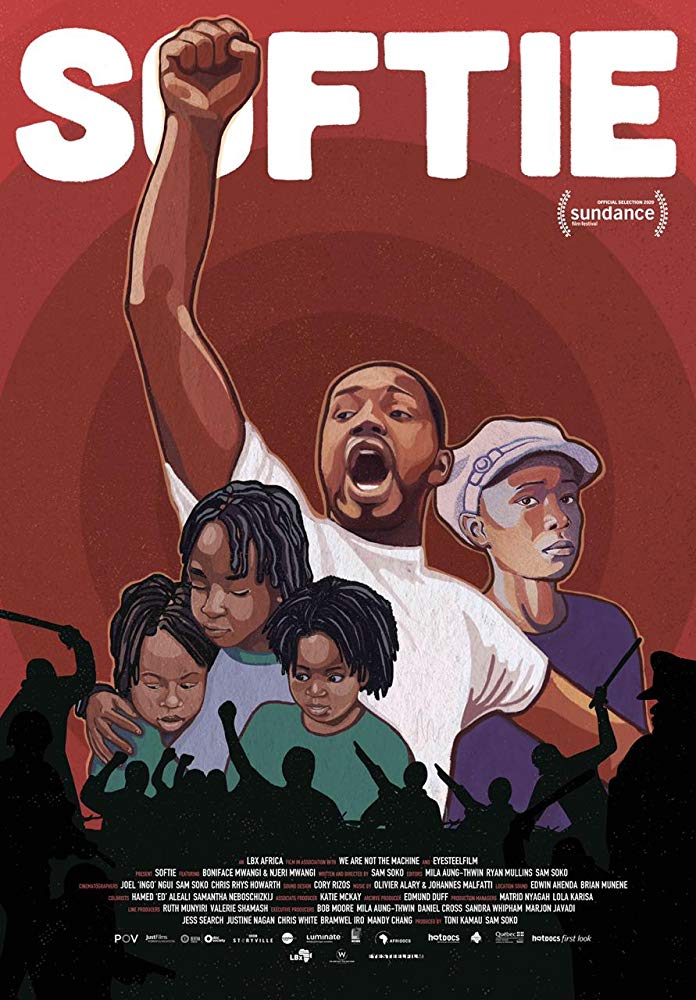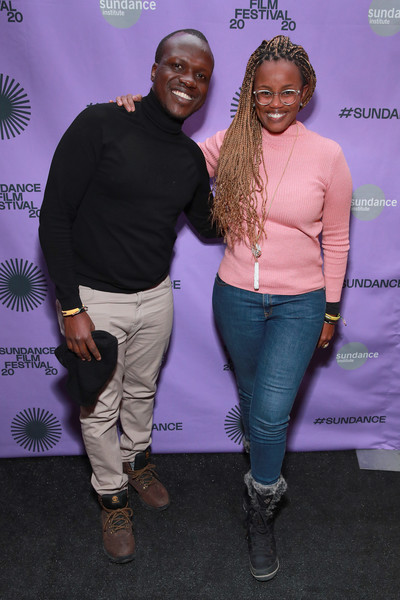I met Toni Kamau in the CNN Lounge during a Brown Girl Doc Mafia mixer at this year’s Sundance Film Festival and within moments we were hugging and laughing. The pure joy she brings in the room is magnetic, so when I heard their film Softie walked away with a World Cinema Special Jury Prize in Editing, I wasn’t surprised at all. She is surrounded with incredible storytellers like herself.
A little about Toni Kamau…
For the last seven years, Toni’s career has focused on producing stories about outsiders, rebels and change-makers. Toni has two ongoing feature documentaries projects – The first, “I am Samuel ”, an LGBTI documentary directed by 2019 Rory Peck winner Pete Murimi. The other, “Laikipia”, a conservation and climate change documentary directed by 2016 Oscar nominee Daphne Matziaraki.
Her latest project, “Softie”, is the first film from Kenya to premiere at Sundance.
What drew you to being part of this project?
I knew the character “Softie”. He is one of Kenya’s most provocative journalists. I was drawn to the project because it seemed like it would much more than a standard hagiography, and something that asked deep questions about sacrifice, family, patriotism, and I was intrigued by that. Also the director Sam Soko was quite passionate about the story and the project and was just an incredibly good human, and I really wanted to work with him.

Can you tell us about your role and what some of your day to day was during the making of Softie?
I got involved in the project late 2017 through my production company “We are not the machine”. Sam Soko, through his company “LBx Africa ” had been working on it as director/producer since 2013 along with the team from Doc Society serving as EPs. Our first task was pitching at Hot Docs Forum 2018 where we won audience award for best pitch and grew our team by collaborating with the Emmy winning team at Eyesteelfilm, who came on board as EPs and post production company. After that, my job involved fundraising, proposal writing, grant reporting, contract negotiations and coordinating regular meetings between team members spread out across 3 continents. Right now we are working on figuring out the impact campaign with Miriam Ayoo, the Softie impact producer.
Being a filmmaker in any capacity brings lessons, what was a stand out lesson you encountered along this project’s journey?
You can do greater things as a team than you can on your own. Every single person on the Softie team was invaluable to us getting to this point – having a documentary not only premiere at Sundance but even win a Special Jury Prize for Editing. Also constant, open communication matters, to help with team dynamics. We have had very brutally honest conversations amongst ourselves as team members, but from a place of love and respect and it’s only made our overall team stronger.

What do you consider is your artistic process when it comes to producing/filmmaking?
As a creative producer, my first question is, “does this story move me?”. I strongly believe that you imbue your passion into your work, no matter the role, and especially as a producer and of course as a director. I work mostly based on instinct, but this instinct is also based on years of producing and consuming content.
What attracted you to producing? When did you know it was going to be your life path?
I like bringing people together and creating. Also I have always been very entrepreneurial. My first “company” was started as a 8 year old kid back in Kenya, when a bunch of neighbourhood kids started a fashion line for dolls in our local apartment block. However we were too many kids in the actual company, so the supply outstripped the demand but we picked ourselves up and moved on to new ventures!
Who is your support team as creator in this field, especially being an African female producer focusing on East African stories being told worldwide? Why are they important to you?
My sister, my close friends and my family are a great support system. They aren’t in the industry but they encourage me and my darling sister has listened to an inordinate amount of pitches. My film community in Kenya – Docubox, East Africa’s only documentary fund hosts a meet up film group that I co founded ,“Film therapy”. We meet up every month at Docubox’s offices to share our project pitches, listen to presentations, review rough cuts. We even had a send off event when the Softie team was leaving for Sundance, where we shared our journey and what we hoped to achieve at Sundance. It gave us some level of accountability as we felt that beyond merely representing one film at a festival, we were representing an entire industry – as we were the first feature documentary from Kenya to premiere at Sundance.
And of course my global community of women in the industry – Brown Girls Doc Mafia is a force and I’m glad to be a witness to it, as the members are doing incredible things across the world and Iyabo (Boyd) and Emily (Cohen Ibañez) have created a powerful platform for women of colour to engage with power brokers in the global documentary industry, and they are listening and paying attention to the women of BGDM – the power of the collective!
Can you describe the moment when you found out this film was going to Sundance?
One of the Sundance programmers texted me asking for the director’s contacts, out of the blue.I had met her at that years Durban Film Festival. The director Soko was in Montreal, working on the edit. This was over a month after submitting to Sundance. I thought we were on a shortlist! It was my first time submitting to this kind of festival. We rehearsed answers to potential questions with Sam, as we both thought that we still needed to pitch the film to move forward in this imagined shortlist. Sam called me some hours afterwards, asking to put me on a video camera. And he said, “We got in!” and I asked, “Into the short list? That’s awesome!” He said, “No Toni, we got into Sundance”. I was in my car, yelled like crazy, the security guard in my office parking lot came to check if everything is OK and I yelled at him, “We got into Sundance!” And Soko and I yelled into the video camera at each other for a while. It was awesome!

How was your Sundance experience as the first Kenyan-produced film in the documentary competition?
We got a lot of love from the Sundance team – from the programmers to the funder team to the artists relation team and our existing production funders really supported us by contributing significantly towards our festival budget. And the film was really well received by audiences. Although the only downside was that it was a bit of an uphill task for our publicity team to pitch our story to American press, as although we had an incredible team of Emmy winning EPs from Eyesteelfilm, Doc Society, we were an unknown director-producer team from Kenya and we did not have the star power or relationships that other US based documentary and fictions teams had. But we went out, talked to everyone and had a lot of fun and we started to get some positive press rolling in after our premiere – basically from word of mouth and persistence by our publicity team and the wider film team.
Any Tips you can give first timers going to the ‘Dance?
Do your research, find community – Brown Girls Doc Mafia did an orientation call and organized events for its members to meet with decision makers. Ask for as much advice as possible. Be nice to everyone. And above all have fun and remember to do thank you emails after the festival.
What kind of impact are you hoping this film will leave on audiences? What kind of impact do you personally want to leave?
We would like the film to leave audiences with the understanding that the personal is political and the political is personal. You can’t afford, especially at this time in the world where the far right is growing more and more influential and our political decisions are being influenced through exploitation of our personal data, you can’t afford at this time to be apolitical or politically disengaged. We all need to do something in our own communities, to challenge the status quo and create better futures for everyone.
Also, it’s a really moving film that explores the themes of sacrifice, love, family and we want to give people a different insight into what it means to be human, as all great documentaries do.
Now that Softie won the Special Jury Award in Editing, what happens next for the film?
We are thrilled that the edit team of Mila Aung Thwin, Sam Soko and Ryan Mullins won the special jury prize for editing. And we were also runners up for the audience award in our category – World Cinema Documentary. It’s a testament to our belief as a film team and as individuals that stories from ALL parts of the world can be truly universal in nature, because we are all connected.
We will do the festival circuit with Softie as we explore world sales options and limited theatrical distribution options in the USA and UK, before we broadcast on POV’s next season.
If you could sit down in a room with anyone in the world, who would that be and why?
It’s a long list! I’m a huge fan of Ava Duvernay – she’s a force and a champion of diverse storytellers and did things her way till the world took notice. Also love that she has used her fame to create a platform for other storytellers.
What is next for you?
There’s a lot coming up! There’s a year long festival circuit for Softie and hopefully broadcast across the world. I have another documentary in late post production that will premiere in festivals later this year, and another in production that should premiere in late 2021. And Soko and I are in early development on a couple of projects and meeting and talking to producers in LA and New York about them. Premiering Softie at Sundance has created such an opportunity for the film team and we think also for other filmmakers from East Africa, as we have proven that we are capable of telling compelling and entertaining and impactful stories from our part of the world.
____________________________________________________________________________
SOFTIE is an intimate look at Boniface Mwangi, a daring and audacious Kenyan photojournalist who decides to run for political office in an effort to change the corrupt political system in Kenya. Soko’s film highlights how misinformation in politics can have long term effects on a voting population, a problem we are facing in America.
Director Sam Soko and subjects Boniface Mwangi and Njerri Mwangi
Produced by Toni Kamau and Sam Soko
VISIT: wearenotthemachine.com
FOLLOW: @toni_producer

